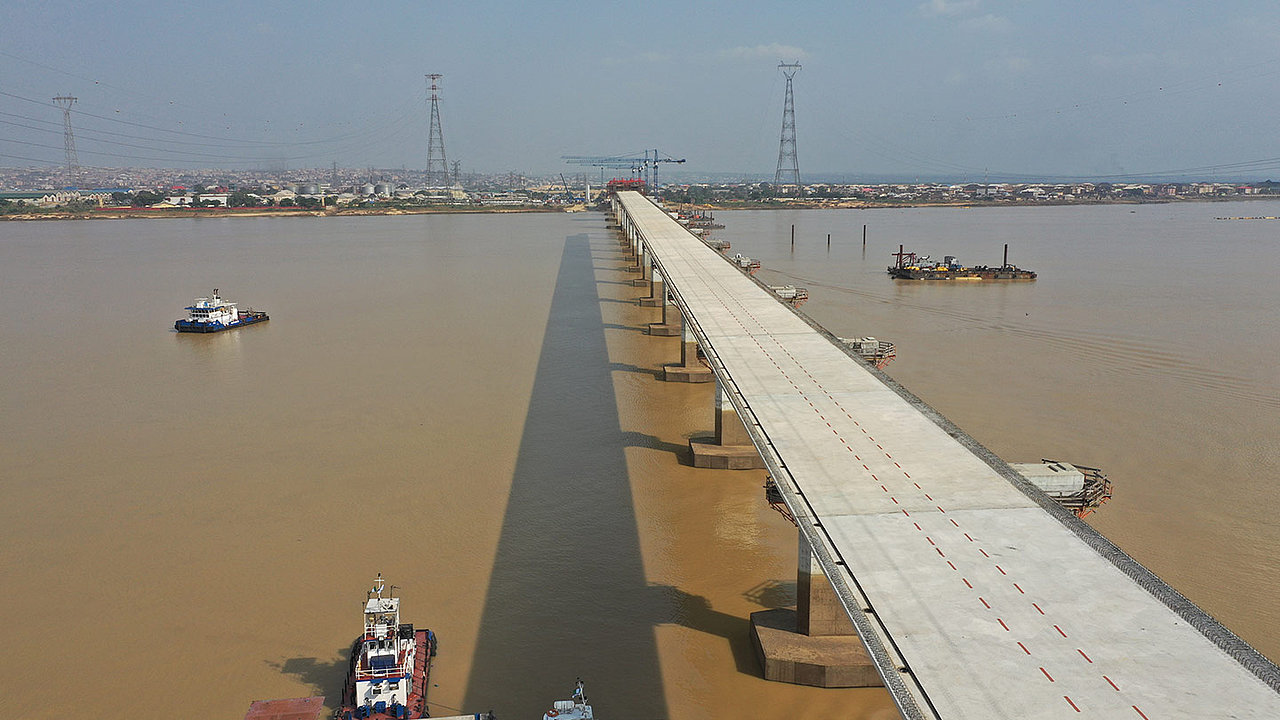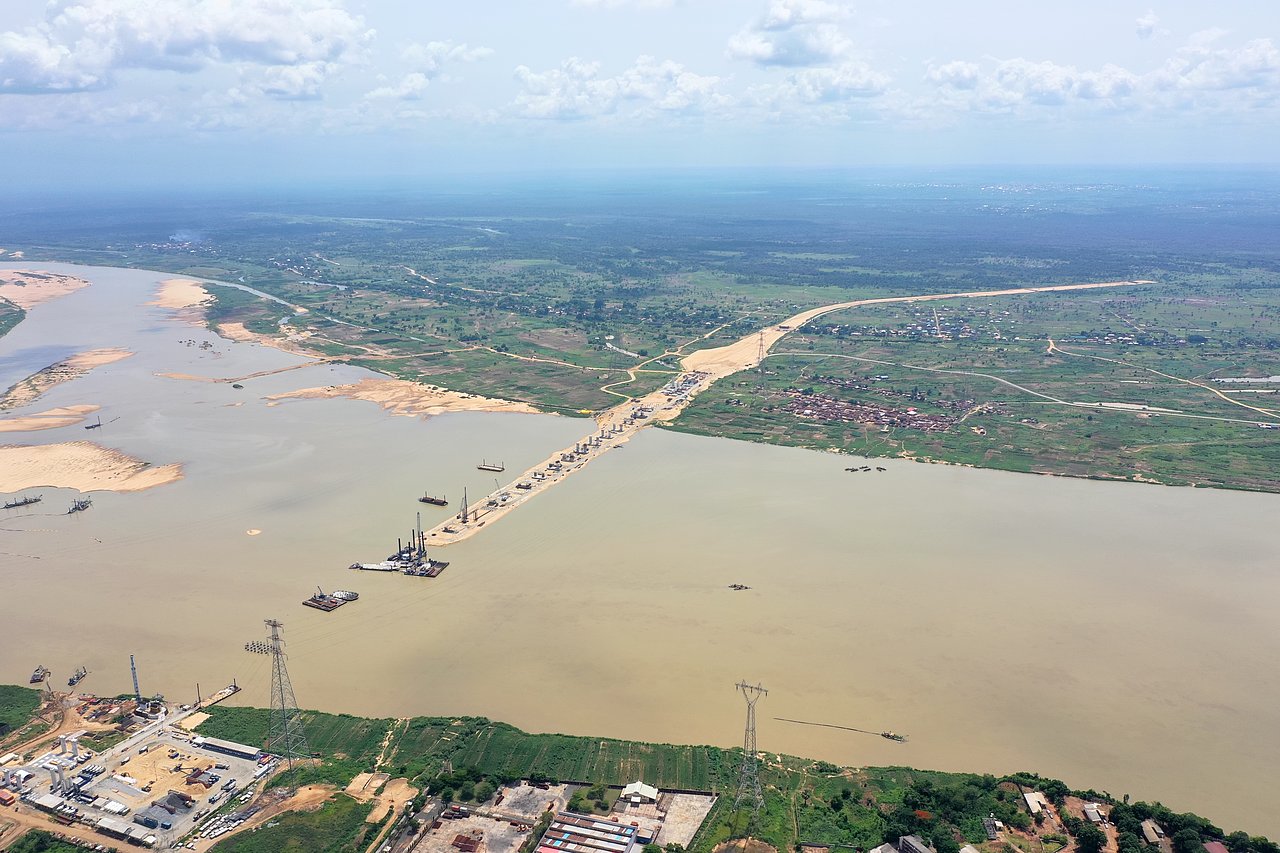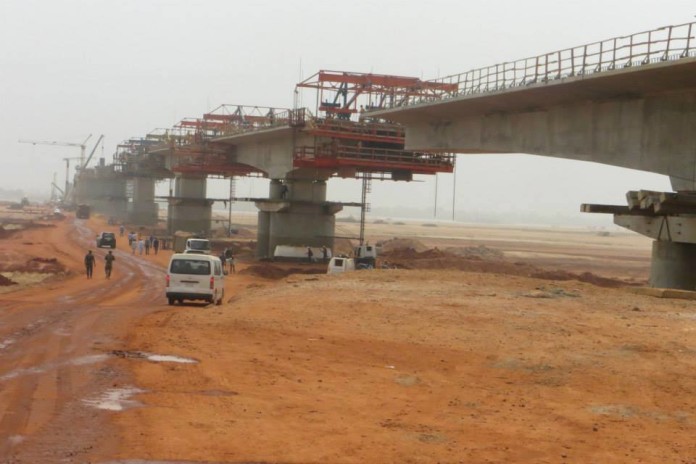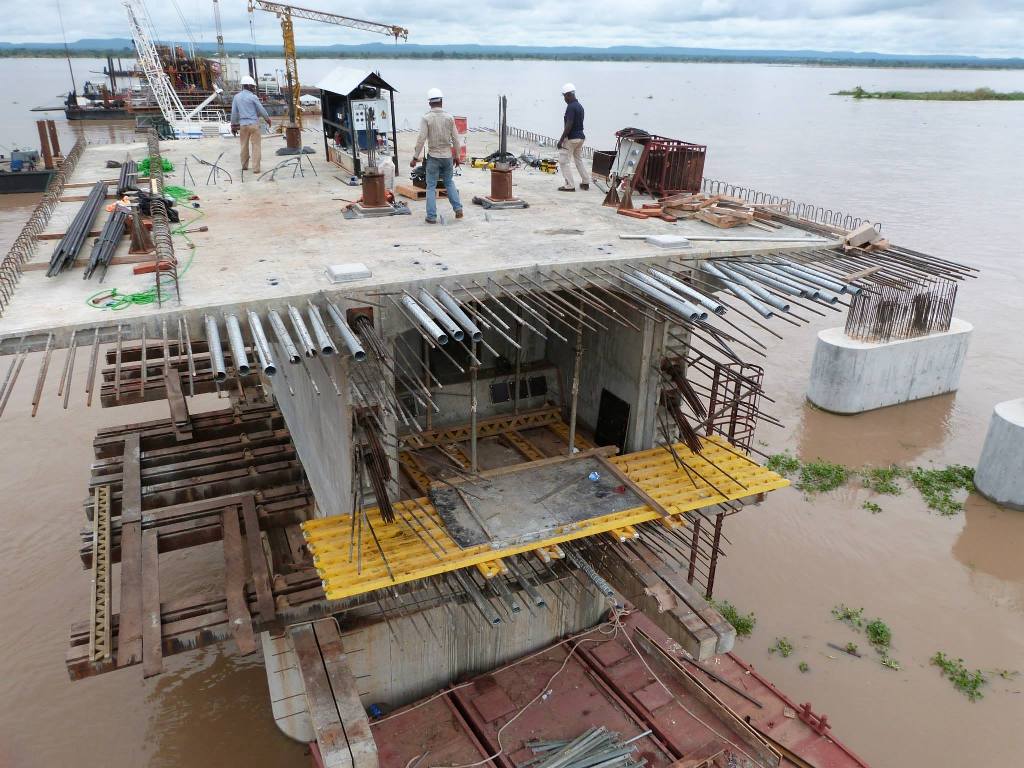The Second Niger Bridge project in Nigeria, which is being carried out by Julius Berger Nigeria Plc, is expected to be completed by October this year if all goes as planned.
This was revealed by Dr. Lars Richter, the Managing Director of Julius Berger when some federal government officials including Minister of Works and Housing, Babatunde Raji Fashola, Minister of Labour and Productivity, Dr. Chris Ngige, and Uche Orji, the Managing Director of the Nigerian Sovereign Investment Authority (NSIA), visited the project’s site to assess the progress.
According to Julius burger, M.D the project is approximately 83 percent complete. He explained that the Bridge’s substructure had been completed, and the superstructure and finishing work were ongoing. In addition, secondary bridges had been built, and culverts and drainage projects were being carried on.
Julius Berger Innovative Solutions
In his briefing, Richter stated that Julius Berger introduced and implemented innovative solutions for soil improvement using the Geotextile Encased Sand Columns concept for base reinforcement.
According to Richter, the innovation is a foundation approach for embankments built on the low-bearing-capacity ground. It also includes massive Prefabricated Vertical Drains, which help to hasten the settlement and consolidation process by allowing settlement to occur during the construction phase.
Minister Fashola praised Julius Berger for this ongoing work and added that by the 2nd of April the project would be awaiting inauguration by the president.
Project overview
The Second Niger Bridge is a Nigerian Federal Government project that is 1.6 km long and furnished with other ancillary infrastructure including a 10.3 km highway, Owerri interchange, and a toll station all at Obosi city.
The Bridge project was first proposed during the 1978/79 political campaign by then-candidate Shehu Shagari of the National Party of Nigeria (NPN). It however gained momentum under the administration of Goodluck Jonathan and is being sustained by President Muhammadu Buhari.
Second River Niger Bridge aims to minimize traffic congestion on the existing bridge over the Niger River and to strengthen the entire region generally. The existing bridge dates back to 1965 and it serves as a major road connection, bridging the cities of Asaba on the west bank and Onitsha on the east bank. It is also a part of the Trans-African Highway between Lagos and Mombasa in Kenya, in addition to being the main east-west connection within Nigeria.
Implementation of the project
The Second River Niger Bridge project is being developed through a public-private partnership (PPP) involving Julius Berger.
The latter is providing the planning, logistics, and construction of the river bridge. The scope of work comprises the construction of a 1,600 m long reinforced concrete river crossing with a maximum span of 150 m as well as 1 motorway junction, 1 toll station, and 10 km of the road network.
Also Read: Kazungula bridge project timeline and what you need to know
The project is divided into 3 sections, which are; the West Approach (755 m, 14 fields with 55 m span each); the East Approach (205 m, 4 fields); and the Main Bridge (630 m, 5 fields with a maximum span of 150 m). They are being built in parallel using the different production methods “clock push” and “cantilever”.
The construction of the bridge, spanning from Asaba to Ozubulu and Ogbaru areas, started back in September 2018 and is expected to be completed in the year 2022.

Project timeline
1978/79
The bridge was first proposed by Shehu Shagari.
1987
General Ibrahim Babangida challenged the local engineers to design The Second Niger Bridge. Rising to the challenge, The Nigerian Society of Engineers called NSE Prems Limited, which subsequently delivered a master plan.
2007
President Olusegun Obasanjo flagged off the project in Asaba.
2012
In August, the Federal Executive Council under Jonathan’s administration approved a contract worth ₦325 million for the final planning and design of the bridge.
April 2014
Second Niger Bridge to cost US$300million
The Federal Government of Nigeria is to construct a second bridge across River Niger by the southeast axis at a cost of US$ 300M is to be completed in 36 months. The bridge is expected to link Ganaja in Ajaokuta Local Government Area to Shintaku in Bassa Local Government Area of the state.
This will bring the long-expected relief to the numerous commuters that ply the existing bridge with agony. The situation is caused by the fact that the old Niger Bridge has remained the only trusted gateway that links the east to the western and northern parts of Nigeria and vice-versa.
The project which is under Public-Private Partnership (PPP) and supported by the Kogi State Government and WALCOTT Nigeria Limited, in conjunction with some financial institutions is expected to improve the economy of the people of the state.
Second River Niger Bridge to be completed on time
The Julius Berger–NSIA Motorways Investment Company (JB-NMIC) Consortium, who are the contractors has given an assurance that the second River Niger Bridge will be completed as scheduled.
The assurance came about following speculations from media reports that the project was suspended due to non-compliance with environmental laws. The consortium cleared the air saying that complying with the Nigerian Environmental Laws is a priority to them, as it is an intrinsic part of the project in collaboration with the relevant ministries.
Currently, the project is underway and on schedule to ensure timely completion of the bridge, which is set to be executed under the Public-Private Partnership (PPP) arrangement for a concessional period of 25 years through the Design, Build, Finance, Operate and Transfer (DBFOT) model.
The construction cost of the bridge is estimated at US$ 698M of which US$ 249.1M has already been provided for the commencement of the project. The project covers 2,150m in length including a 600m bridge plus train tracks.
Aug 2014
Upgrade of the second Niger Bridge in Nigeria commences

Upgrade of the second Niger Bridge, including its arteries and connections, has commenced in Delta, Edo states, and the South-South region in Nigeria.
According to Vice President Namadi Sambo, the commencement was approved by the Federal Government directing the Minister of Works to establish the actual areas that need quick attention, noting that the completion of the second Niger Bridge upgrade project will likely attract an increased flow of traffic.
He further elaborated that the designs of the second Niger Bridge must be presented for the future idealization of the road since the work is scheduled to commence by 2015. The Federal Government plans to have railways in all the areas to make the transportation system more effective, and the transformation programme is expected to benefit Nigerians.
The allocation comprises Ebu, Illah, Emu, Inyede, and Igbedo as the host and im¬mediate benefiting communi¬ties of the Utor River Bridge on the Asaba-Illah-Emu-Ahia-Uromi Road. Utor River Bridge project was previously abandoned by the administrations and eventually revived, approved, and funded by President Jonathan.
May 2015
2nd Niger Bridge declared a hoax
The leader of the Ohanaeze Ndigbo Caretaker Committee Chief Ralph has declared the construction of Nigeria’s 2nd Niger Bridge project a campaign deception by President Goodluck Jonathan and that no financial commitment had been made by the federal government. The committee made the revelation when they met President Buhari at the Defence House in Abuja recently.
The Minister of Works for Nigeria, Mike Onolomemen under whom the construction of the bridge falls at the beginning of the year said a lot had been done since the flag-off of the project in March 2014. He said the contracting firm, Julius Berger Nigeria, was engaged because of its antecedents, adding that almost all the procurements for the construction of the bridge were imported. According to him, work was in progress with the piles being driven into the ground and dredging going on along the River Niger.
The bridge to date is not completed and little can be seen on the ground to testify to its near completion.
“When the first bridge was built, it was during the presidency of Nnamdi Azikiwe; the second Niger bridge will be built under the presidency of Azikiwe Jonathan. I will go on exile on the completion of my term in office if I didn’t build the bridge by 2015″. Jonathan made that promise in his remarks at a Town Hall Meeting held in the commercial city of Onitsha while still President
Aug 2015
Set back as construction of second Niger bridge in Nigeria is halted
The ongoing construction project of the Second Niger Bridge in Nigeria has been put on hold until further notice from the federal government.
This was announced by Aminu Diko the Director-General of Infrastructure Concession Regulatory Commission, who attributed the project delay to the non-issuance of the Certificate of Compliance, non-compensation of the host community, non-adherence to due process in the award of contract, and the actual cost of the bridge.
The Federal Government of Nigeria has so far issued US$91.35m out of the pleaded US$ 149.75m towards the project construction. However, the Sovereign Wealth Fund (SWF) provided the US$2bn which is being managed by the Nigerian Sovereign Investment Authority (NSIA) under the joint venture of the public, a private partnership between the Nigerian Government and some private equity capital firms, including the NSIA.
However, the total cost of the construction of the second Niger bridge in Nigeria was initially estimated to cost US$539.1m but due to the falling value of the Nigerian currency in relation to other world currencies, the cost has raised to US$ 588.52m. Besides, according to Obinna Ihedioha, the Vice President, Infrastructure Investment and Special Advisor to the Managing Director and Chief Executive Officer of the Project clarified that the initial project cost did not include the VAT and when the VAT was included the cost went up by US$49.42m.
Even though the affected communities have not yet been compensated adequately, the Niger Bridge in Nigeria will be constructed and operated on a Design, Build, Finance, Operate, and Transfer (DBFOT) basis.
2018
Nigeria approves US $575.5m for construction of second Niger Bridge link Road

The Federal Executive Council (FEC) of Nigeria has approved US $575.5m for the construction of the 11.9 km link road to the second Niger Bridge.
Confirming the statement, the Minister of Information and Culture, Alhaji Lai Mohammed, said the project which was initiated by the former administration of former President Goodluck Jonathan under the private-public partnership (PPP) but collapsed, has been taken over by the federal government, awarding the contract to Julius Berger.
Construction delays
According to Mohammed, the contract meant to be executed within 24 months was awarded to Setraco following the failure of the earlier contractor to whom the project was awarded to execute the project.
“Completion period is set to take 24 months. What happened was that the contract was awarded earlier to a company that failed and now Setraco has taken over while the contract of the other contractor has been rescinded,” he said.
Mohammed also added that besides the memorandum on the link bridge that was approved by FEC, the council has also re-awarded Oji- Achi- Mmaku- Awgu- Ndeabor road in Enugu State at a cost of US $32.3 m.
The second Niger bridge will include not just the link road, but also associated infrastructure and link Anambra and Delta States.
Aug 2019
Construction of the Second Niger Bridge project in Nigeria on track
Construction of the Second Niger Bridge project in south-eastern Nigeria is on track and progressing well. The Federal Ministry of Works in charge of Anambra state, Engineer Adeyemo Ajani revealed the reports and said that the project is likely to be completed before the approved date.
The work capacity of the project has employed between 1000 and 1300 workers optimally engaged. According to Engineer Adeyemo Ajani, the project is currently it is 23% complete.
Feb 2020
Construction of 2nd Niger Bridge in Nigeria to be completed in early 2022

Construction of the 2nd Niger Bridge in Nigeria is set to be completed by February 2022, the engineering construction contractor handling the project, Julius Berger Nigeria Plc. has confirmed.
The Julius Berger Project Manager for the works, Engr. Friedrich Wieser gave the assurance to the Minister of Works and Housing, Mr. Babatunde Fashola when he paid an inspection visit to the 2nd Niger Bridge project site at the Anambra axis.
According to Eng. Wieser, Julius Berger has mobilized 1,300 workers and 425 equipment to the site to effective project delivery as scheduled. “The Bridge is being designed in line with the applicable standards. The available resources and logistical efficiencies deployed contribute to the timely and successful completion of the project.
33% complete
He further confirmed that the construction works were 33% complete. “We’re currently doing sand filling of a 7km access road to the bridge and it will be completed by September this year. For now, we have no challenges,” he affirmed.
Speaking during the tour, Mr. Fashola said that the completion of the 2nd Niger Bridge project as scheduled was a top priority agenda to the President, Muhammadu Buhari. He described the bridge as a missed opportunity of the past that has become today’s responsibility, adding that it is a front and center project for the President to improve infrastructure and develop the economy.
August 2021
Construction of 2nd Niger Bridge, currently 62% complete, on schedule
The Nigeria Sovereign Investment Authority (NSIA), the Nigerian establishment that manages the West African country’s sovereign wealth fund, through its managing director, Uche Orji, has announced that phase 1 construction of the 2nd Niger Bridge is 62% complete and expressed optimism that it will be fully completed by next year (2022) as per the schedule.
This announcement comes barely 18 months after the project contractor Julius Berger Nigeria through the project manager, Eng. Friedrich Wieser revealed that the construction works were 33% complete and assured the Federal Minister of Works and Housing, Mr. Babatunde Fashola, when he paid an inspection visit to the project site at the Anambra axis that the project would be completed in February 2022.
Project overview
The 2nd Niger Bridge is a Nigerian Federal Government project that is 1.6 km long running across Nigeria’s Niger River and spanning from Asaba to Ozubulu and Ogbaru areas. It will be furnished with other ancillary infrastructure including a 10.3 km highway, Owerri interchange, and a toll station all at Obosi city.
Also Read: Construction of 2nd Niger Bridge in Nigeria to be completed in early 2022
According to the NSIA managing director, the project is being implemented into three phases. These are Phase 1, which is 62% complete; Phase 2A, which when completed the bridge will start operating; and Phase 2B.
“Phase 1 is the first project awarded to NSIA and it is what we are focusing on at the moment. Its construction is expected to be completed in 2022 and from what I’ve seen, I can confidently say that it will be completed by then” explained Mr. Orji.
The 2nd Niger Bridge project was initiated under the administration of former President Goodluck Jonathan and is being sustained by President Muhammadu Buhari.
December 2021
The Federal Controller of Works in Anambra, Mr. Adeyemo Ajani revealed that the Second Niger Bridge project was well on course for completion in the second quarter of 2022. He said that to this far work had been completed on the Enugu bound lane from Umunya to Awka, and that work would commence on the Enugu bound lane in January 2022.
The aforementioned bound lanes are a part of the Enugu-Onitsha expressway that connects the South East and South-South, through the Niger Bridge, linking Anambra, Enugu, and the Ebonyi States, as well as the North, via Benue and Kogi States.

Leave a Reply